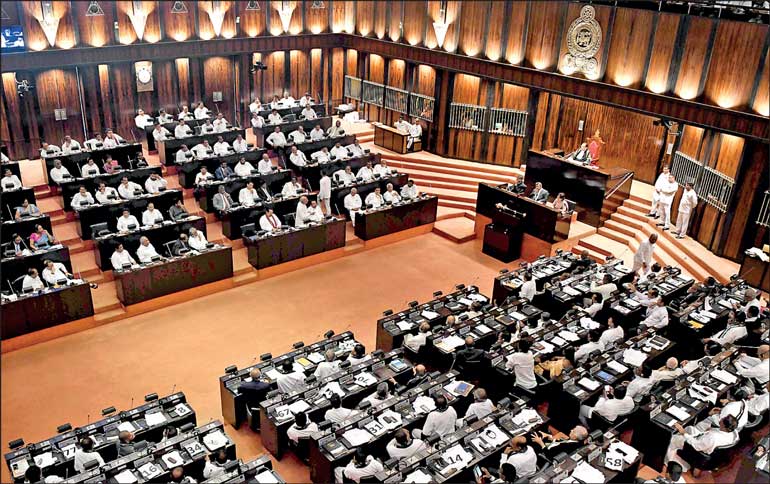Saturday Feb 14, 2026
Saturday Feb 14, 2026
Tuesday, 7 November 2023 00:10 - - {{hitsCtrl.values.hits}}

The oversight committees of the Parliament should device a system to prevent wrongful expenditure before the expenditure is committed rather than carry out post-mortems long after the horse is dead, buried and decayed
The success of the PBO and its benefit to the country depends on the quality of the staff. A proper head hunting should be done, without haste. Irrelevant paper qualifications should not be given any weightage. Appropriate qualification and relevant experience in addition to these attributes – integrity, intelligence and energy
 The President in his policy statement in the Parliament mentioned the establishment of a Parliamentary Budget Office among other reforms and accordingly Act No. 6 of 2023 provides for the establishment of the Parliamentary Budget Office. Some may ask why another Budget Office when there is already a Budget Department under the Ministry of Finance. The functions of these two offices are quite different, though the names have some semblance.
The President in his policy statement in the Parliament mentioned the establishment of a Parliamentary Budget Office among other reforms and accordingly Act No. 6 of 2023 provides for the establishment of the Parliamentary Budget Office. Some may ask why another Budget Office when there is already a Budget Department under the Ministry of Finance. The functions of these two offices are quite different, though the names have some semblance.
Present budgeting process
The Budget preparation process involves 14 departments of the Treasury, three key revenue earning Government departments and the Finance Commission (FC). The FC determines the revenue sharing among the Provincial Councils. There is also a consultation process of several representative groups including the public.
The initial approval of the Cabinet is obtained before the Budget call to all the ministries, departments and other institutions which seek budget provisions. Several discussions are held by the Budget Department with the ministries and departments before finalising the draft final estimates, which is submitted for Cabinet approval.
The Cabinet approved draft estimate is presented to Parliament as the Appropriation Bill and after the Parliamentary formalities are completed the speaker endorses the Budget, i.e. the Appropriation Act. The Minister of Finance then issues a warrant before the commencement of the New Financial Year. Funds can then be drawn from the consolidated fund.
Parliamentary Budget Office (PBO)
The oldest Parliamentary Budget Office was created in 1936 by Belgium by a Royal Decree of 31 January 1936 and was called the “High Council of Finance”. Reforms were made in 1967 and 1981. The current structure of the “High Council of Finance” is by a Royal Decree of 3 April 2006. New tasks were assigned by agreement of 13 December 2013.
The Budget Office of the US congress was established in 1974. Several other countries Korea, UK, Sweden, Canada, Hungary and Australia have established Parliamentary Budget Offices called by different names after year 2003
It is an independent body financed out of public funds, staffed by non-elected professionals mandated to provide oversight of fiscal performance, non-partisan advice and guidance on fiscal policies. It is responsible to the Parliament; in some countries it is responsible to the Executive.
Objectives
The objectives are to improve fiscal discipline in the collection of State revenue and the management of capital and recurrent expenditure, raise the quality of debate, scrutiny, transparency and accountability.
Revenue
It is revenue that needs more analysis and deep study than expenditure. A study of the revenue sources should be made to see whether the sources are appropriately taxed or are they over/under taxed or not taxed at all.
Determine the sectors which affect the cost of living of the low income segment and whether they are over taxed compared to their earnings.
Government in increasing taxes to meet the budget deficit should be very cautious and do a deep study of all the implications of increasing or imposing direct or indirect taxes on new items. The poor in most countries are the largest segment. The logic behind taxing the largest segment is that a small percentage increase will give a large amount of revenue. But the poor feel even a small percentage increase. The PBO would have done this study and will be able to advise the Finance Minister of a suitable increase.
Taxes on earnings of State and private sector employees need careful study to see whether their take home pay is adequate to maintain a family providing food, clothing and shelter. A healthy family is not a burden on the health system. Nourished children perform well in school? The workforce who contribute to productivity should be healthy and nourished. This is also the prime responsibility of a Government.
Expenditure
It is the responsibility of the State to provide employment opportunities, not necessarily in Government service. It should not over employ labour of all categories to ease unemployment. The State should provide opportunities to the private sector to create employment. The State sector too should study in depth the manpower requirement and should not exceed the approved cadre. Reducing unemployment by overloading the State sector leads to indiscipline, reduction in productivity, corruption, administrative costs.
It is better to pay a dole to the unemployed rather than over employ and pay for all the attendant problems of over employment. The cost of the dole will be much less than the cost of over employment and the attendant problems.
The post audit system should be reviewed. The internal audit is a toothless tiger. Internal audit is the weakest department in Government organisations. The external auditors and the internal auditors should work on one jointly prepared audit program. Internal audit departments should be strengthened. The system should provide for the internal audit to take immediate action on serious corruption and financial matters either directly reporting to the appropriate parliamentary oversight committee to prevent corruption and waste, or through the Government audit.
The oversight committees of the Parliament should devise a system to prevent wrongful expenditure before the expenditure is committed rather than carry out post-mortems long after the horse is dead, buried and decayed. The cost of the post mortem is also a waste and the purpose is not achieved. It is the commitment and procurement systems that have to be put right.
Financial discipline
The Parliamentary Budget Office will bring in financial discipline in every department which collects Government revenue and incurs project, capital and recurrent expenditure. There are provisions in the PBO Act No. 6 of 2023 to enforce financial discipline in Government institutions. The Budget Office will monitor during the financial year the fiscal performance and/or advise the Government on fiscal policy matters.
Benefits to the people
The system provided by Act No. 6 of 2023 is an assurance to the people that the taxes paid and expenses incurred are closely monitored and studied during the year itself by independent professional officers who are not under the direction or control of any Minister, not even the Finance Minister or the Prime Minister or the President.
The people have access to all the reports and costs given to any oversight committee or information provided according to Act No. 6 of 2023. A group of people interested in information can request it from the PBO. The people on their part have to be vigilant. The PBO can issue regulations on their own to any Government department or institution, to instil financial discipline. The PBO has the authority to hire the services of any technical expert of their choice to assist the PBO.
National planning
Budgeting is not to find ways and means of revenue sources to meet Budget deficits, in the ensuing year. Some people think it is so.
Budgeting is to finance a plan for the whole country. It should be ONE plan for ONE country, prepared by One Central Department or a Ministry, of course with inputs from different ministries. A planning commission should decide the national priorities. Instead of different departments or ministries deciding the priority for their projects only. This leads to lopsided development due to lack of consistent development strategy.
The present practice of seeking Budget provisions by different departments for development projects without knowing in sufficient detail what other developments that are to take place, which may be relevant to the functions of other departments/institutions, should be changed, if we are to get the full benefit of the PBO.
Some suggestions for preparatory work
Our economic sectors should be classified according to global standards. All Government departments and institutions should be brought under the appropriate sector. Our GDP also should be computed according to these sectors and then aggregated. Even large private sector companies and institutions should be classified accordingly.
Even the appointment of ministers should be for each sector or if the sector is too large more than one minister may be appointed but to an identified sub sector.
The suitability of a person to be in charge of a ministry should be after an evaluation according to some criteria.
The country plan mentioned above also should be according to these sectors.
Staff to the Parliamentary Budget Office
The Parliamentary Budget Officer and the Deputy Parliamentary Officer shall be appointed by the President on the recommendation of the Constitution Council. In terms of Sections 5 and 8 respectively of Act No. 6 of 2023.
The success of the PBO and its benefit to the country depends on the quality of the staff. A proper head hunting should be done, without haste. Irrelevant paper qualifications should not be given any weightage. Appropriate qualification and relevant experience in addition to these attributes – integrity, intelligence and energy (varied experience is better than one year’s experience repeated many times).
Top MNC in developed countries look for these three attributes in recruiting CEOs and senior staff. Look for these attributes: integrity, intelligence and energy. They also say if a person has the last two attributes in abundance and minimal of the first one (Integrity), he will with his abundance ruin the organisation. We have seen this has happened in abundance in our SOEs.
Lal Bahadur Shasthri (Great Man), the second Prime Minister of India, has said the following:
“Shasthri had understood that India’s economic problems were caused by a concentration of ownership in the hands of the state without the requisite means of ensuring the efficient implementation. Coupled with this was a strangulating web of rules and regulations which frustrated even the private sector. Both these factors resulted in delays, wastage and huge cost overruns, as well as rapidly growing corruption.”
(The writer holds an FCMA (UK) CGMA, and has consultancy experience from 1994 to date both as Local and International Consultant. His consultancy experience is mainly state projects funded by international agencies like ADB, World Bank and others.)